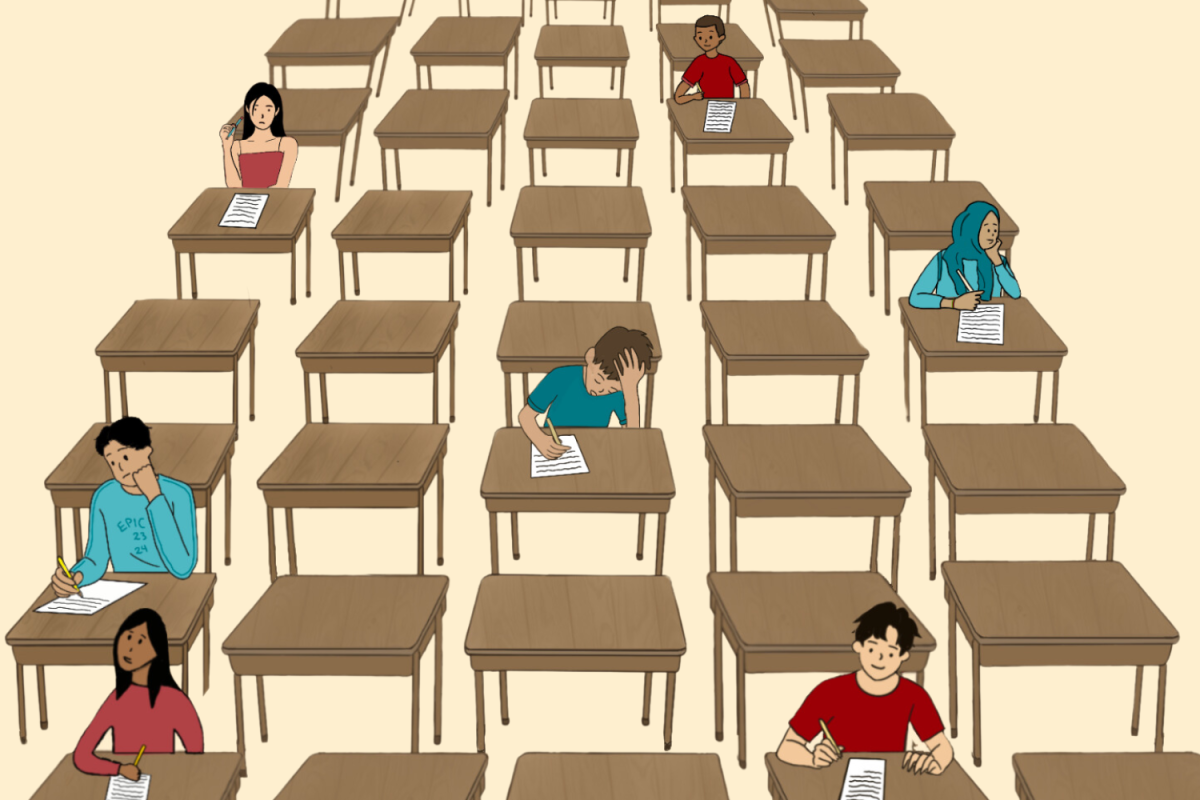The phone rings in the main office — another absence call for a supposedly sick student. Coincidentally, multiple teachers are giving tests on that day. Spikes in absences on days when tests are administered have become a rising concern. This phenomenon has been dubbed “test flu”. While many students are genuinely sick, some students miss school just to skip exams. At a school like Lynbrook, academics often weigh students down. Though not taking a test on the chosen day may seem like a quick and simple solution to avoid facing an obstacle, this habit of avoidance poses detrimental effects on students, affects their classmates and negatively impacts the teacher’s lesson plans. Instead, students should prioritize communication with teachers and recognize the multiple consequences of test flu to ensure effective learning.
There are many reasons why students may choose to miss class on the day of a test. One reason is that the student does not feel prepared due to a lack of studying or not prepared enough to do well on the test. A factor that may create this course of action is the amount of stress that students may feel from a heavy workload or procrastination leading up to the test. Some students come to school with minimal sleep while dealing with constant pressure to achieve high grades. In the long run, these students risk and sometimes cope with their anxiety by avoiding taking tests to have more time to study and potentially get a higher grade.
“Testing anxiety and academic pressure affects students,” sophomore Susanna Khubchandani said. “Without good grades, some may think that their future prospects are ruined and that they’re not going to get anywhere in life.”
For the student, feelings of unpreparedness can grow with the extra time before taking the makeup test, inducing more stress and creating a cycle of procrastination. Students will also find themselves needing to make up missed classwork if asked to make up a test in class. If they develop the habit of avoiding a test, they will find themselves fostering unhealthy habits such as avoiding responsibility, which can hurt them in the long term as they move on to college and the workplace. These harmful habits may influence students’ way of dealing with future problems negatively: by avoiding them.
“The more we respond to anxiety or fear by avoiding it, the stronger this response becomes in our brains,” school therapist Jenna Starnes said. “We start to believe that our only option is to avoid, and thus, we become even more fearful and uneasy when we face a situation that makes us uncomfortable. This can generalize to other performative tasks in our lives, and the consequences may be more severe than those found in high school.”
Integrity is often cast aside when students resort to habits like test flu in hopes of getting a higher grade. Students may circulate information about a test to their peers who have yet to take it, causing some students to gain an unfair advantage over others, in addition to the fact that they will have more time to study. If there are too many absences during a test day, teachers may be inclined to increase the difficulty of the makeup test.
“I think what students should do is to drop the extreme fear of failing,” physics teacher Anshul Agarwal said. “Most of the classes allow for some sort of retake and a chance to recover. Avoiding things creates a negative spiraling effect because it disrupts the teachers’ plans and the student’s chances to learn from feedback in a timely manner. Moreover, for future success, students need to learn how to deal with their fears as they come and be able to face the outcome, whatever it may be.”
It is also important for students to consider the plethora of problems test flu can cause for teachers. If many students have yet to take a test, the teacher must communicate with them all to find suitable times for each of them to make up the test. In addition, teachers need to make multiple versions of tests in order to maintain test security, further adding to their heavy workload. This can push back plans for lessons and affect the rest of the students because most teachers will be unable to pass back tests or go over answers before all students have taken the test. This delays the schedules teachers plan ahead of time.
“One of the negatives is that I can’t go over things from any of the tests until everyone has taken them,” math teacher Sarah Kraemer said. “Students who have to make it up are holding back from me being able to hand off the test and go over it.”
It is important to strike a balance that respects students and educators by prioritizing their well-being while holding them accountable for their academic responsibilities. Students should be able to take mental health days when needed but should not abuse that system to miss a test.
“Mental health days are important for students when they feel overwhelmed but should not be used to skip a test,” sophomore Brian Lee said. “It’s okay to feel overwhelmed but avoidance should not be the solution that we turn to.”
Rising test flu cases also affect the workload of attendance clerks who find themselves taking phone call after phone call about students feeling ill. This phenomenon has increased significantly around AP testing season as more students find themselves stressed about AP tests and wanting more time to review.
“My workload has increased around 40% to 50% because of calls coming in early in the morning,” attendance accounting specialist Jena Rajabally said.
Of course, students are encouraged to stay home when they are actually ill, yet another reason why students faking illness is detrimental to their peers. Those who are actually sick may be disadvantaged during retakes because some teachers are inclined to make a retake more challenging when they think students are skipping tests.
With busy schedules, including demanding extracurriculars and the pressure to achieve success academically, mental health is often neglected. It is imperative that students find a balance between work and rest. Students should address the test flu’s root cause: stress. This can be achieved through effective time management and actively seeking assistance when needed. Teachers can reciprocate such steps by posting clear makeup work policies and fostering classroom cultures that allow students to express their concerns about test schedules.
“I think we have to be respectful of one another and not take advantage of the shared trust,” English teacher Terri Fill said. “High school is training for college and career life in which you do need to do your share of work and believe in yourself. All of those things will be needed in the adult world too. Trust the process; students don’t have to be perfect to do well and it’s okay to take a test or write an essay that they may not feel 100% prepared for. We as teachers have to encourage students to be okay with a reasonable amount of struggle because that is how we can help them grow.”



































































